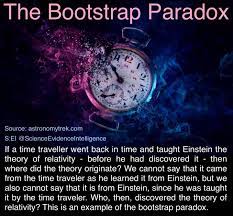

The Bootstrap Paradox: Who is the original writer?
The Bootstrap Paradox is a concept in time travel fiction that revolves around the question of who the original writer of a particular piece of work or information is. It is named after a famous time travel paradox, the grandfather paradox, which was first introduced by Robert A. Heinlein in his 1941 science fiction novel "By His Bootstraps."
In the Bootstrap Paradox, an object or information is said to be "bootstrapped" when it is brought back in time from the future and becomes the original version of itself. This creates a loop in which the object or information has no discernible origin. It raises the question of where the original version came from and who the original creator or writer was.
One of the most well-known examples of the Bootstrap Paradox is seen in the episode "Blink" of the television series Doctor Who. In this episode, a character named Sally Sparrow receives a message from the Doctor on a DVD, warning her about the Weeping Angels. She later gives this DVD to the Doctor in the past, allowing him to record the message and send it to her in the future. The DVD itself has no clear origin or creator, as it is caught in a time loop.
Another example can be found in the movie "Predestination" (2014), based on the short story "All You Zombies" by Robert A. Heinlein. The protagonist is revealed to be both the mother and father of her own child due to a series of time travel events. This paradoxical situation creates a bootstrap loop where the child has no original parents.
It is important to note that the Bootstrap Paradox is a fictional concept and does not have a definitive answer in reality. It is often used as a narrative tool to explore the complexities and paradoxes of time travel. However, it has been widely discussed and analyzed by fans, writers, and scholars of science fiction.
In conclusion, the original writer of a piece of work or information in the Bootstrap Paradox is unknown and cannot be determined due to the nature of the paradox itself. It is a concept that challenges the notion of causality and the linear progression of time, making it a fascinating and thought-provoking element in time travel fiction.
Related Posts
© 2025 Invastor. All Rights Reserved

User Comments
Salvador Nacho
2 years ago
here is my example: Think about a person going back in time to give Shakespeare a copy of his own plays. But then Shakespeare publishes the plays, and they're attributed to him. Who actually wrote the plays? Did Shakespeare create them, or did they come from the future? This paradox hints at the perplexing idea of causal loops and the possibility of information or events creating themselves.